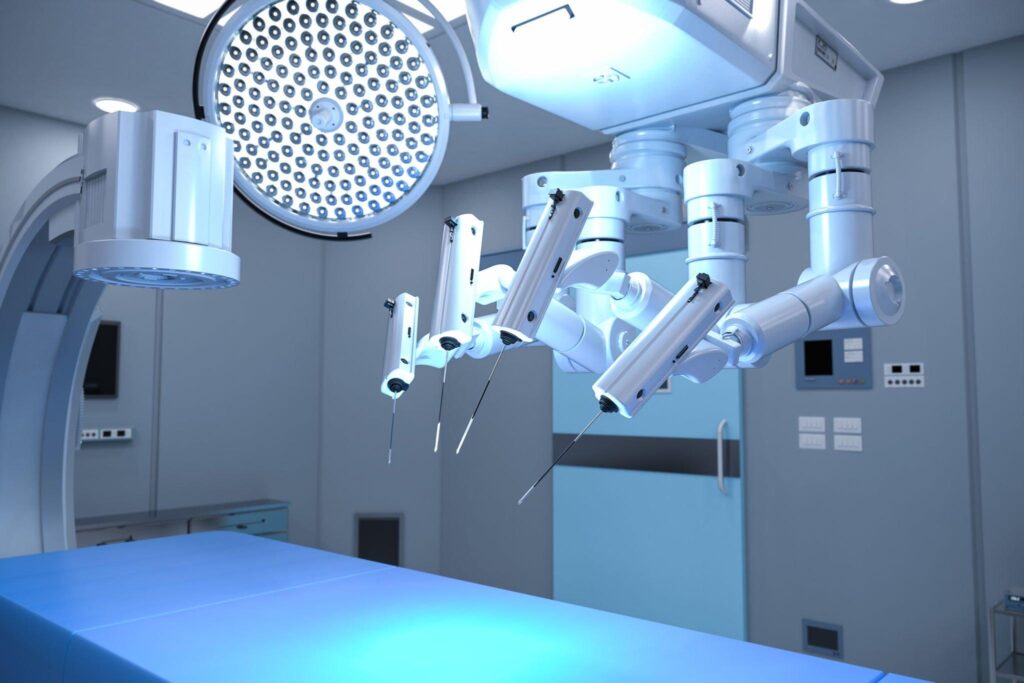ROBOTIC SURGERY FELLOWSHIP COURSE
- Introduction to the theory and principles of robotic surgery in preparation for safe robotic surgical practice.
- Understanding the foundational principles of robotic surgery including: the history, robot and console setup, the fundamentals of operating, achieving robotic surgical competency and much more.
- Gain exclusive insight and instruction from our real world faculty of accomplished and expert robotic surgeons as well as world class aviation and medical simulation educators.
Total Program Duration: 1 Year
- 2 Months Surgery
- 4 Months – Spinal Cord/Ortho
- USMLE I & II Optional Training
Recommended for all doctors who are commencing robotic surgery practice including surgeons, trainees, surgical assistants and residents.
- This course is intended to introduce graduate students, to various aspects of the design and application of robotic and other mechatronic systems and devices for surgical robotics.
- The course will consist of lectures, hands-on laboratory exercises, and presentation of live surgical robotic cases and also educate in the state of the art and current trends in the expanding multidisciplinary field of surgical robotics.
- The course aims to introduce the robotic approach to young surgeons with no experience with robotic surgery (Da Vinci Si or Xi) but preferably with some knowledge or exposure to the system.
- The Course program combines Interactive Theoretical Sessions and Dry Lab Exercises.
The program’s curriculum is organized to provide increasing levels of responsibility for trainees with respect to patient care and procedure performance which is assessed on the basis of evaluating each fellow’s
- Clinical Judgement
- Clinical skills
- Medical knowledge
- Procedural Skills
- Professionalism and Communication Skills
- Leadership ability and continuing scholarship.
1. MODULE I: BASIC TRAINING (System Training)
- Structure
- Basic training should preferably follow a common approach with similar pathways across all sub-specialty groups.
2. MODULE I: BASIC TRAINING (System Training)
- 2 days of e-/virtual learning:
- Theoretical knowledge about principles of robot assisted surgery (e.g., e-BRUS)
- Dry lab and drill training with robot
- Virtual training on robot virtual training module or on a stand-alone virtual training system.
- 1 month of assistance at robot assisted procedures,At first assisting and subsequently stepwise performing level 3-4 laparoscopic procedures.
3. MODULE II: TRAINING COURSE (Advanced Hands-On Training)
- Structure
- a) Theoretical system training (half a day).
- b) System and basic procedural training on animal models (3-4 days)
- c) At least one day of observation and discussion/evaluation of a procedure in a training center.
4. MODULE III: MENTORED WORK (Advanced Case Training under Supervision)
- Theoretical (e-learning on-line, by video and simulation) training. Training should focus on stepwise training of the index procedures
- E-learning should include information on patient selection and preparation, port placement, non-technical skills training, trouble shooting, emergency scenario management information, and information on additional equipment.
- Assisting and subsequently stepwise (modular) performing a level 3 laparoscopic procedure
- Team training, including emergency scenarios, team decision making, bedside
- To be an independent surgeon the trainee should have performed at least 10 cases mentored/proctored by an experienced trainer.
- Observing peri-operative care and outcome.
- Designed by surgeons for surgeons and gain confidence to take on new opportunities.
- Content delivered by experts in simulation, high fidelity synthetic models and robotic surgery.
- Teaching delivered by leading experts and clinicians to the highest medical standards.
- Short intensive courses with a minimum time investment and maximum learning outcomes.
- Continuous post-course support through online learning and Q&A sessions.
- Comprehensive programs with theory and practical sessions for applicability of knowledge.
After assessment shows adequate performance and enough scores by the trainee, subject to which the trainee will receive an accredited certificate that shows he/she has successfully passed the curriculum for robot assisted surgery.


